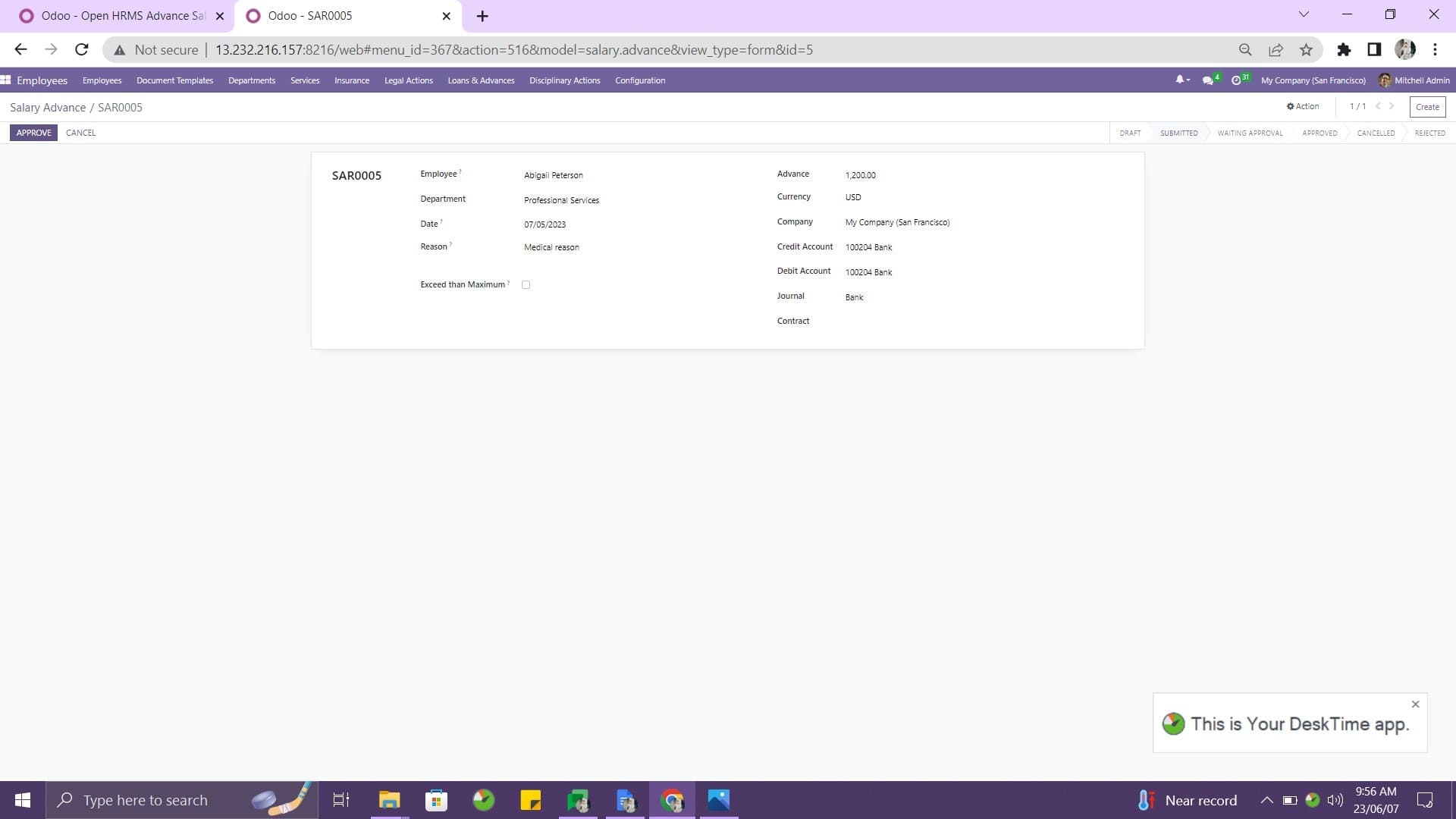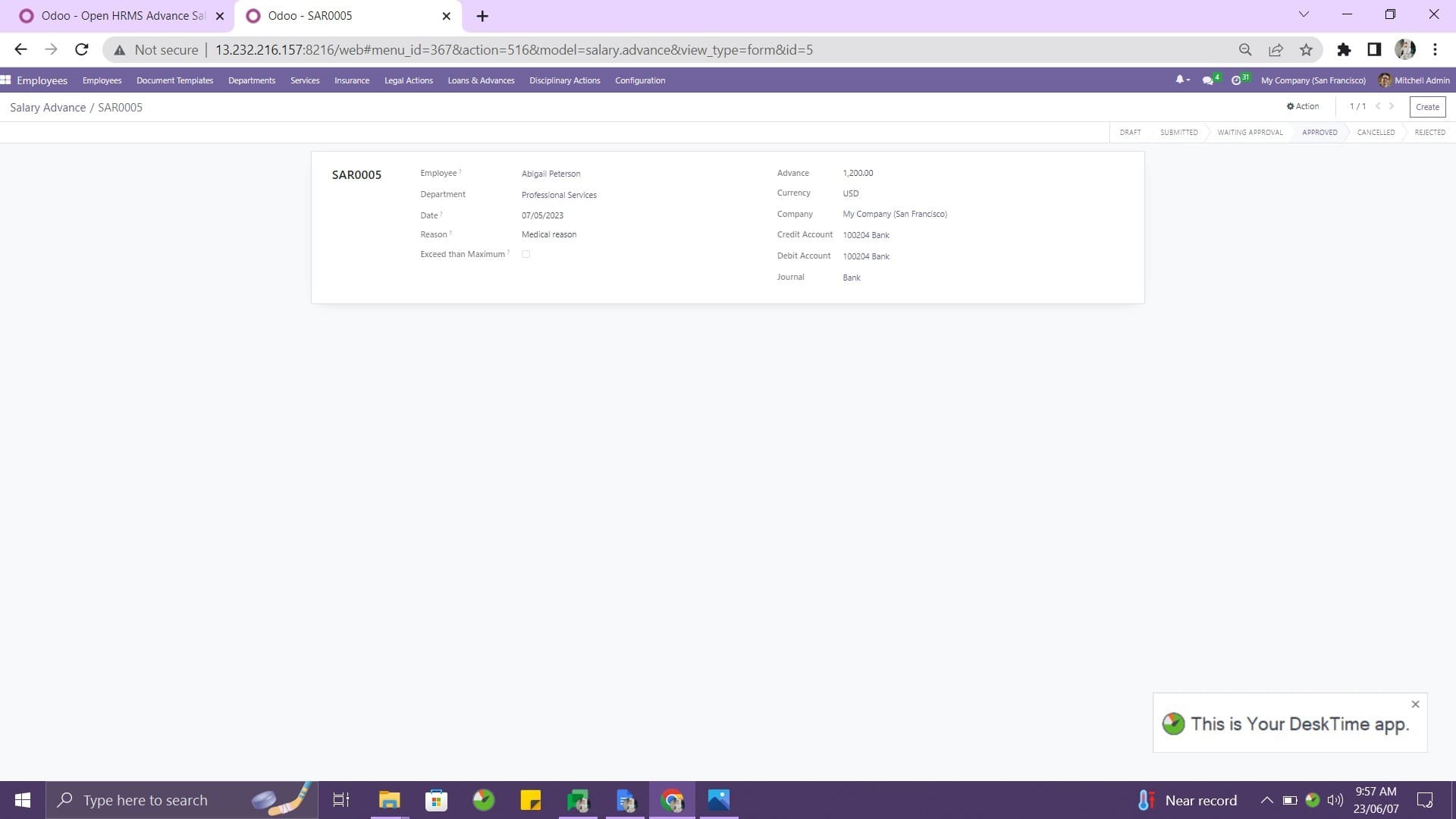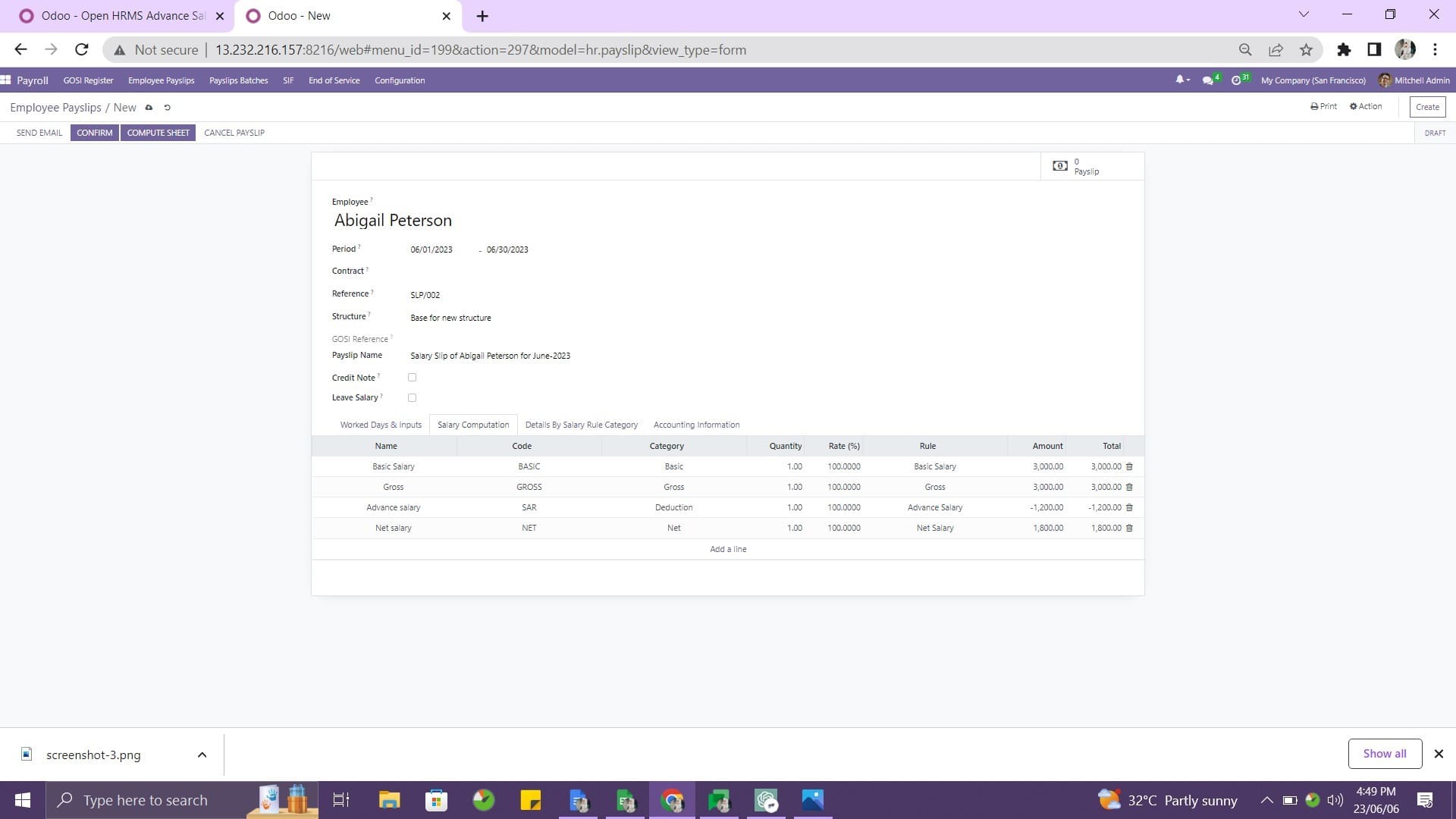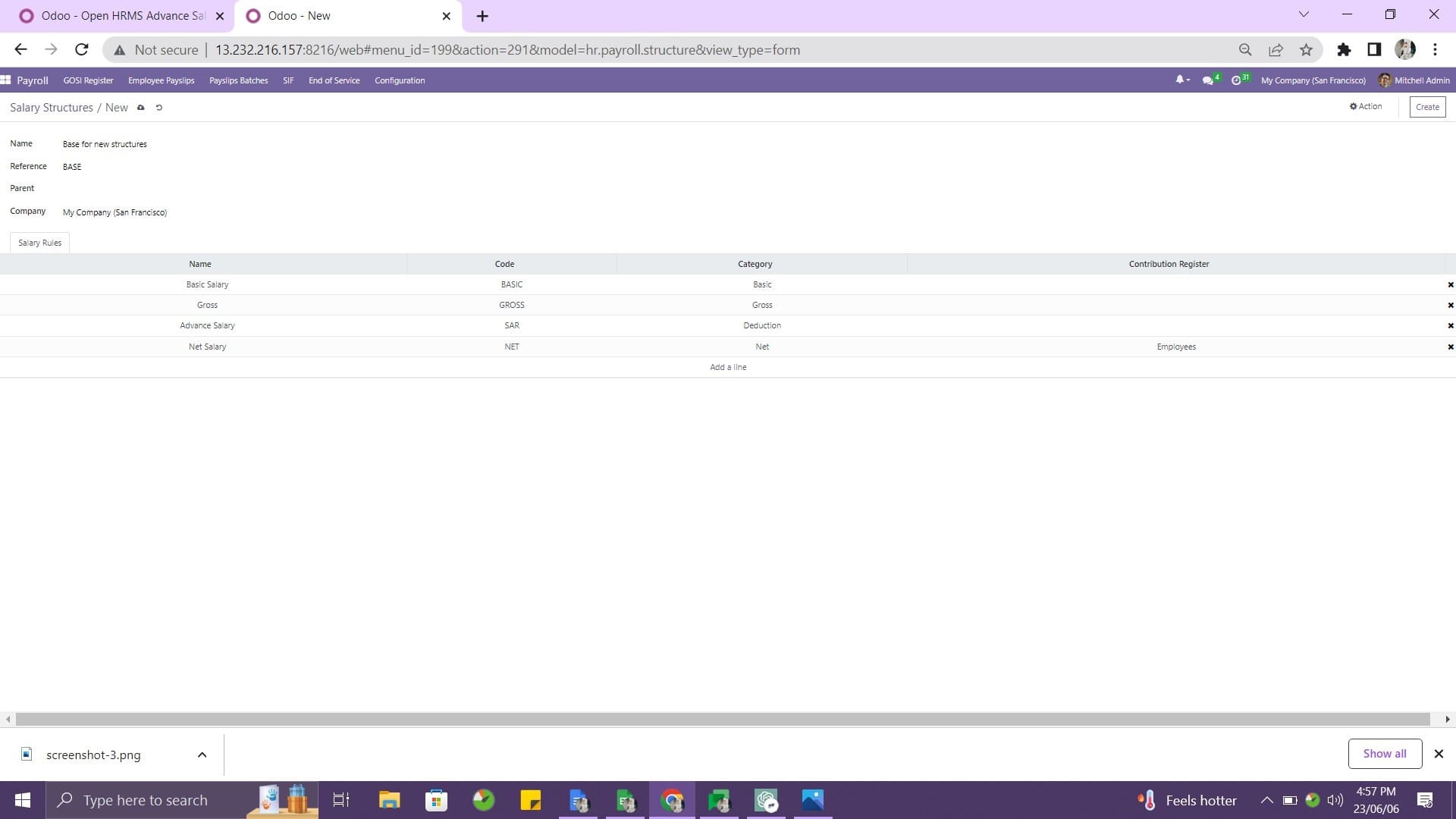Top 6 Benefits of Open HRMS Advance Salary Module
Introduction:
The Open HRMS Advance Salary Module is a critical component of the Open HRMS suite that focuses on managing employee salary advance requests. This module streamlines and automates the handling of salary advances, ensuring accuracy, transparency, and compliance with company policies. Managing salary advance requests is an important aspect of human resource operations. Employees may require financial assistance for a variety of reasons, including unexpected expenses or emergency situations. HR departments can effectively handle these requests by implementing the Open HRMS Advance Salary Module, providing employees with the necessary support while maintaining proper control and documentation.
Streamlining the salary advance process has a number of advantages for HR operations. It eliminates manual paperwork and time-consuming administrative tasks, allowing HR professionals to focus on more strategic duties. Furthermore, it improves the accuracy of salary advance calculations, ensuring that employees are paid the correct amount in accordance with company policies and regulations. Organizations can improve employee satisfaction and optimize HR processes by utilizing the Open HRMS Advance Salary Module to create a seamless and efficient workflow for salary advance requests.
Employee Requesting Advance Salary
The Open HRMS Advance Salary Module provides employees with a convenient and streamlined process for requesting advance salary. Here is a step-by-step guide on how employees can submit their requests:
1)Navigate to the request submission interface
Within the module, employees can easily locate the option to request advance salary.
2)Fill in the necessary information
Employees are required to provide relevant details, such as the desired advance amount and the reason for the request. Additionally, they may need to specify the preferred repayment method or any other necessary information.
3)Submit the request
After filling out the required fields, employees can click on the "Submit" button to send their advance salary request.

It is critical for employees to submit detailed requests. Employees facilitate a smooth evaluation process by providing accurate details and a valid reason for the advance. Clear requests allow HR personnel to efficiently assess the request's eligibility and validity. The submission interface in the Open HRMS Advance Salary Module is intended to be simple and straightforward. This ensures that employees can easily navigate the process, saving time and reducing potential confusion.
In all, allowing employees to request salary advances through the module improves transparency, accountability, and efficiency in the salary advance process. Employee requests that are clear and comprehensive contribute to smoother evaluations and faster processing, which benefits both employees and HR operations.
Hr & Accounts Department Approval:
In the Open HRMS Advance Salary Module, the approval process for salary advance requests involves the HR and Accounts departments. Here is an overview of how the approval workflow works:
1.Employee Submits Salary Advance Request
The employee initiates the salary advance request through the module, providing the necessary details and supporting documentation.
2.HR Department Review
The request is first routed to the HR department for review. HR professionals assess the request based on predefined criteria, such as eligibility, available funds, and adherence to company policies.
3.HR Department Approval
If the HR department finds the request satisfactory and within the approved guidelines, they approve the salary advance. This signifies their agreement to process the advance payment.
4.Accounts Department Review
After HR approval, the request is forwarded to the Accounts Department. The Accounts team verifies the financial feasibility of the request, ensuring that the necessary funds are available for the salary advance.
5.Accounts Department Approval
If the Accounts Department confirms the availability of funds, they grant approval for the salary advance. This step signifies their endorsement of the advance payment.
6.Salary Advance Processed
Once both HR and Accounts departments have approved the request, the salary advance is processed. The approved amount is disbursed to the employee through the designated payment method.

This collaborative approval process involving the HR and Accounts departments ensures that salary advances are reviewed, authorized, and processed accurately and in compliance with company policies. It enables effective control over the disbursement of funds while providing employees with timely financial assistance when needed.
Salary Deduction
In the Open HRMS Advance Salary Module, the deduction of the salary advance from an employee's salary is automated during the payslip creation process. Here is an overview of how the salary deduction works:
1.Salary Advance Amount
Once the salary advance request is approved and processed, the module calculates the amount of the advance that needs to be deducted from the employee's salary.
2.Payslip Creation
During the payslip creation process, the module considers the approved salary advance and deducts the specified amount from the employee's gross salary.
3.Deduction Calculation
The module automatically calculates the deduction amount based on the agreed-upon repayment terms, such as a fixed deduction amount or a percentage of the salary.
4.Net Salary Calculation
After deducting the salary advance amount, the module calculates the net salary by subtracting all applicable deductions, including taxes, benefits, and other deductions.
5.Payroll Processing
The deducted amount is reflected in the payslip and is considered in the overall payroll processing. The employee receives a payslip that shows the deducted salary advance amount along with other earnings and deductions.

The Open HRMS Advance Salary Module ensures accuracy and eliminates the need for manual calculations by automating the salary deduction process. It streamlines the payroll process and provides employees with transparency regarding salary advance deductions. This method of systematic deduction assists employees in repaying the advance amount over the agreed-upon period while maintaining accurate payroll records.
Salary Advance Rules
In the Open HRMS Advance Salary Module, you can define salary advance rules in the salary structure to establish guidelines for salary advances. Here's how you can configure these rules:
1.Salary Structure Configuration
Access the salary structure settings in the module and navigate to the section for defining salary advance rules.
2.Maximum Advance Percentage
Specify the maximum percentage of an employee's salary that can be granted as a salary advance. For example, if the maximum advance percentage is set to 50%, an employee can request an advance of up to 50% of their salary.
3.Advance Days
Set the number of days for which an employee can receive an advance salary. This determines the duration for which the advance will be applicable. For instance, if the advance days are set to 30, the employee can request an advance salary for a maximum of 30 days.
4.Considerations for Rule Configuration
When configuring these rules, it's important to align them with company policies and guidelines. Consider factors such as employee eligibility criteria, financial stability of the organization, and any legal or regulatory requirements that govern salary advances.

By setting up these salary advance rules in the salary structure, you establish clear guidelines for employees and ensure consistency in granting advances. These rules help maintain control over the salary advance process, prevent excessive advances, and provide a structured framework for managing employee requests.
Benefits of Open HRMS Advance Salary Module
The Open HRMS Advance Salary Module offers several advantages for effective salary advance management. Here are some key benefits:
1.Improved efficiency in processing requests
The module streamlines the entire process of salary advance requests, eliminating manual paperwork and reducing administrative burden. HR administrators can easily track and manage employee requests within a centralized system, ensuring timely processing.
2.Enhanced transparency
The module promotes transparency by providing a clear and structured platform for employees to request salary advances. Employees can easily submit their requests, and HR administrators can track the status and progress in real time. This transparency fosters trust and open communication between employees and HR.
3.Accurate tracking and recording
With the module, all salary advance requests and approvals are recorded accurately in the system. This ensures proper documentation and eliminates the risk of errors or discrepancies. HR administrators can access historical data and generate reports for better analysis and decision-making.
4.Customizable rules and limits
The module allows organizations to configure advance salary rules and set limits based on their specific policies and employee eligibility criteria. This customization ensures compliance with internal guidelines and promotes fairness in the distribution of salary advances.
5.Time and cost savings
By automating the salary advance process, the module saves valuable time and reduces administrative costs. HR administrators can focus on strategic tasks rather than manual paperwork, leading to improved overall productivity.
6.Employee satisfaction and well-being
Offering a streamlined and transparent process for salary advances demonstrates the organization's commitment to employee well-being. Employees can easily request advances when facing financial challenges, promoting financial stability and reducing stress.
Overall, the Open HRMS Advance Salary Module significantly improves the efficiency, transparency, and accuracy of salary advance management. By leveraging its benefits, organizations can effectively meet employee financial needs while maintaining control and compliance in the salary advance process.
Conclusion
In conclusion, this blog provided a comprehensive overview of the Open HRMS Advance Salary Module and its advantages for managing salary advance requests. The module's purpose, the importance of streamlining the salary advance process, and how to configure advance salary rules were all discussed. We also looked at how employees can request advance salary, how to set advance salary limits and advance days in the salary structure, and the benefits of using the module.
Organizations can improve their efficiency in processing and tracking salary advance requests by utilizing the Open HRMS Advance Salary Module. The module improves transparency by providing a centralized location for employees to submit requests, as well as accurate tracking and recording of advances. Customizable rules and limits ensure compliance and fairness, leading to employee satisfaction and well-being.
In all, the Open HRMS Advance Salary Module is a valuable tool for HR operations, offering streamlined processes, cost savings, and enhanced accuracy. By leveraging its features, organizations can effectively manage salary advance requests, promote transparency, and prioritize employee financial well-being.